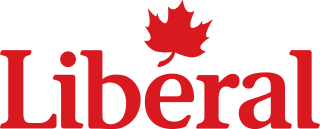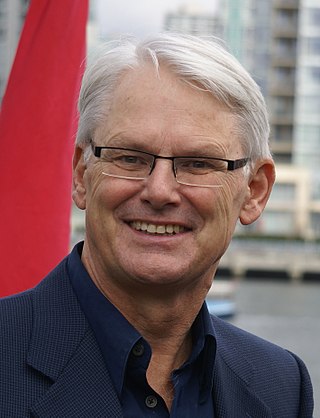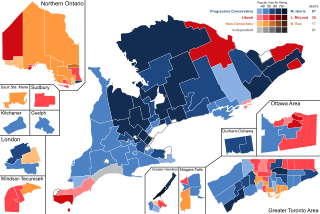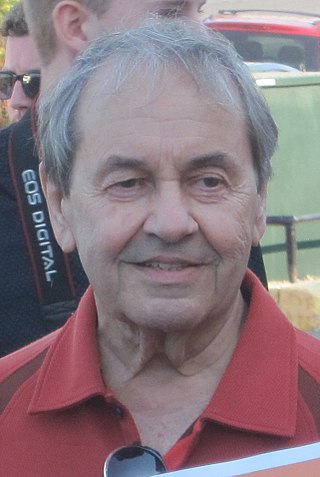Related Research Articles

Charles Joseph Clark is a Canadian businessman, writer, and politician who served as the 16th prime minister of Canada from 1979 to 1980.

The Liberal Party of Canada is a federal political party in Canada. The party espouses the principles of liberalism, and generally sits at the centre to centre-left of the Canadian political spectrum, with their main rival, the Conservative Party, positioned to their right and the New Democratic Party positioned to their left. The party is described as "big tent", practising "brokerage politics", attracting support from a broad spectrum of voters. The Liberal Party is the longest-serving and oldest active federal political party in the country, and has dominated federal politics of Canada for much of its history, holding power for almost 70 years of the 20th century. As a result, it has sometimes been referred to as Canada's "natural governing party".

The 2003 Ontario general election was held on October 2, 2003, to elect the 103 members of the 38th Legislative Assembly of the province of Ontario, Canada.

The Ontario New Democratic Party is a social democratic political party in Ontario, Canada. The party sits on the centre-left of the political spectrum and currently forms the Official Opposition in Ontario following the 2018 general election. It is Ontario’s provincial wing of the federal New Democratic Party.

The 1980 Canadian federal election was held on February 18, 1980, to elect members of the House of Commons of Canada of the 32nd Parliament of Canada. It was called when the minority Progressive Conservative government led by Prime Minister Joe Clark was defeated in the Commons.

The 2001 British Columbia general election was the 37th provincial election in the Province of British Columbia, Canada. It was held to elect members of the Legislative Assembly of British Columbia. The election was called on April 18, 2001 and held on May 16, 2001. Voter turnout was 55.4 per cent of all eligible voters.

The 1996 British Columbia general election was the 36th provincial election in the Province of British Columbia, Canada. It was held to elect members of the Legislative Assembly of British Columbia. The election was called on April 30, 1996, and held on May 28, 1996. Voter turnout was 59.1 per cent of all eligible voters. The election is notable for producing a "false-winner" outcome, rewarding a party that got second in the popular vote with a majority government.

The 1995 Ontario general election was held on June 8, 1995, to elect members of the 36th Legislative Assembly of the province of Ontario, Canada. The writs for the election were dropped on April 28, 1995.

The 1990 Ontario general election was held on September 6, 1990, to elect members of the 35th Legislative Assembly of the province of Ontario, Canada. The governing Ontario Liberal Party led by Premier David Peterson was unexpectedly defeated. Although the Peterson government, and Peterson himself, were very popular, he was accused of opportunism in calling an election just three years into his mandate. In a shocking upset, the New Democratic Party (NDP), led by Bob Rae, won a majority government. This marked the first time the NDP had won government east of Manitoba, and to date the only time the NDP formed the government in Ontario.

John R. Rodriguez was a Canadian politician. He served as the mayor of Greater Sudbury, Ontario from 2006 to 2010 and previously represented the electoral district of Nickel Belt in the House of Commons of Canada from 1972 to 1980 and from 1984 to 1993 as a member of the New Democratic Party.

The premiership of Stephen Harper began on February 6, 2006, when the first Cabinet headed by Stephen Harper was sworn in by Governor General Michaelle Jean. Harper was invited to form the 28th Canadian Ministry and become Prime Minister of Canada following the 2006 federal election, where Harper led his Conservative Party to win a plurality of seats in the House of Commons of Canada, defeating the Liberal government of Prime Minister Paul Martin. Harper led his Conservatives to win a larger minority government in 2008, and then a majority government in 2011. In the 2015 federal election, Harper's Conservatives lost power to a Liberal majority government led by Justin Trudeau.
John Harold Hare was a Canadian politician, agrologist and professor.

The 2011 Canadian federal election was held on May 2, 2011, to elect members to the House of Commons of Canada of the 41st Canadian Parliament.
Polls leading up to the 2000 Canadian federal election.
Polls leading up to the 1997 Canadian federal election.
Polls leading up to the 1993 Canadian federal election.
Polls leading up to the 1988 Canadian federal election.
This article is about polls leading up to the 1984 Canadian federal election.
This article is about polls leading up to the 1972 Canadian federal election.
This article is about polls leading up to the 1968 Canadian federal election.
References
- 1 2 Simpson, Jeffrey (May 21, 1979). "Polls say it's a tie, but Tory lead likely". The Globe and Mail. p. 1.
- ↑ Lavigne, Yves (May 15, 1979). "Tories still leading Liberals, CBC-Carleton survey says". The Globe and Mail. p. 2.
- ↑ "Conservatives are ahead, CBC poll says, although Trudeau more popular than Clark". The Globe and Mail. April 24, 1979. p. 9.
- ↑ "Poll shows Liberals in front of Tories, Clark says voters underestimate him: The national campaign". The Globe and Mail. April 26, 1979. p. 9.
- 1 2 "35% of voters undecided, March Gallup poll says". The Globe and Mail. April 5, 1979. p. 9.
- ↑ "PM is ahead of Clark, TV poll says". The Globe and Mail. February 26, 1979. p. 4.
- ↑ Simpson, Jeffrey (March 8, 1979). "Tories, NDP pleased despite a slight lead by Liberals in Gallup". The Globe and Mail. p. 9.
- ↑ Simpson, Jeffrey (February 8, 1979). "Vote chances dim after newest poll puts parties even". The Globe and Mail. p. 8.
- ↑ Trueman, Mary (January 11, 1979). "PCs still ahead: Tories peaked early, jubilant Liberals say". The Globe and Mail. p. 1.
- ↑ Stevens, Geoffrey (December 13, 1978). "Federal political prospects". The Globe and Mail. p. 6.
- ↑ "Shows I was right,' Trudeau says of poll". The Globe and Mail. November 2, 1978. p. 8.
- ↑ Simpson, Jeffrey (October 5, 1978). "Tories gain four points in latest poll". The Globe and Mail. p. 8.
- ↑ "Poll doesn't show provincial split, senator objects". The Globe and Mail. September 8, 1978. p. 8.
- ↑ Palango, Paul (August 10, 1978). "Not disheartened by poll drop, Tory leader itching for fight". The Globe and Mail. p. 8.
- ↑ "Poll showing Liberal lead fails to upset Tory leader". The Globe and Mail. June 8, 1978. p. 10.
- ↑ Stevens, Jeffrey (May 11, 1978). "Figuring the Gallup". The Globe and Mail. p. 6.
- ↑ "Spring vote fever sweeps Ottawa after latest poll". The Globe and Mail. April 6, 1978. p. 8.
- ↑ "Grits gain over Tories, NDP". The Citizen. April 5, 1978. p. 10.
- ↑ "Liberal strength declines". The Citizen. January 18, 1978. p. 8.
- 1 2 3 4 5 6 7 "Poll shows Liberal support down". The Citizen. December 7, 1977. p. 9.
- ↑ Gray, John (July 13, 1977). "Liberals could win in a walk". The Citizen. p. 1.
- ↑ Gray, John (June 2, 1977). "Liberals ponder fall vote". The Citizen. p. 7.
- 1 2 MacPherson, Bill (May 11, 1977). "Liberal popularity climbing". The Citizen. p. 1.
- ↑ "Tories cut wide swath in Quebec". The Citizen. January 5, 1977. p. 7.
- 1 2 3 4 "Liberals gaining in popularity". The Citizen. December 1, 1976. p. 7.
- 1 2 3 4 "Tories holding impressive lead". The Citizen. August 4, 1976. p. 7.
- 1 2 3 4 5 6 Sellar, Don (April 7, 1976). "Tories surge ahead". The Citizen. p. 1.
- 1 2 3 4 "Federal Grit support down". The Citizen. August 6, 1975. p. 7.
- 1 2 3 4 5 6 7 "Liberals gain, Tories dip in latest survey findings". The Citizen. April 2, 1975. p. 59.